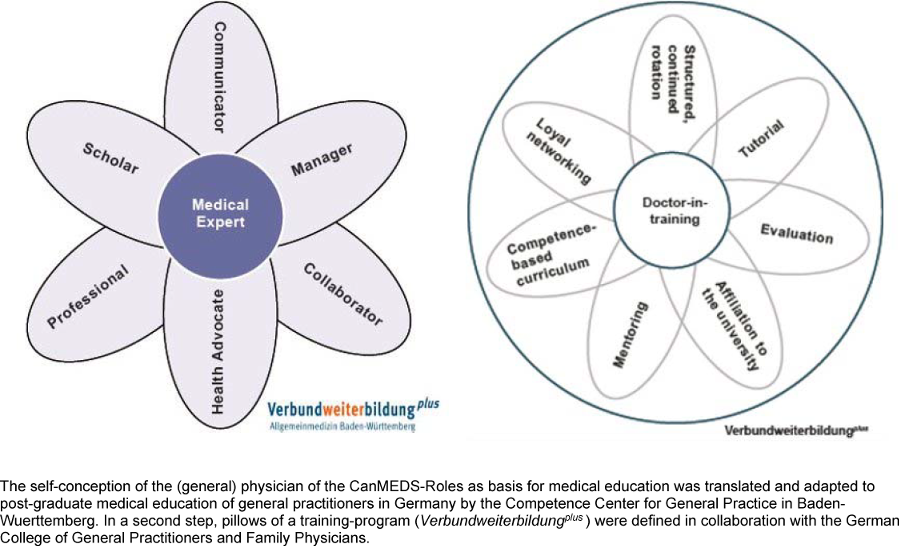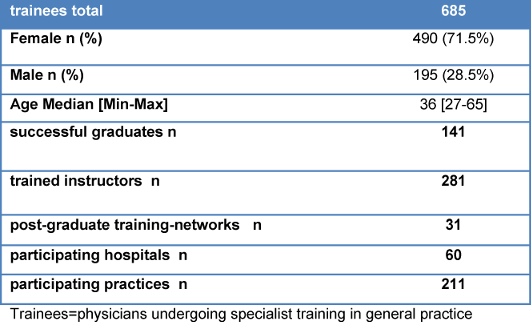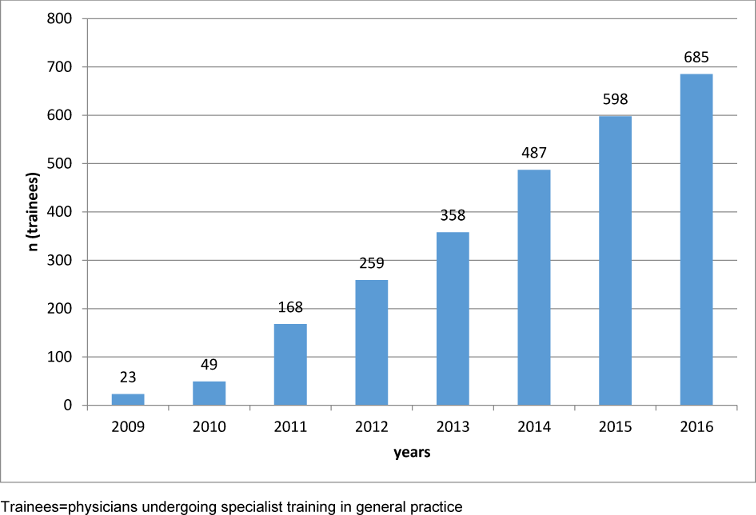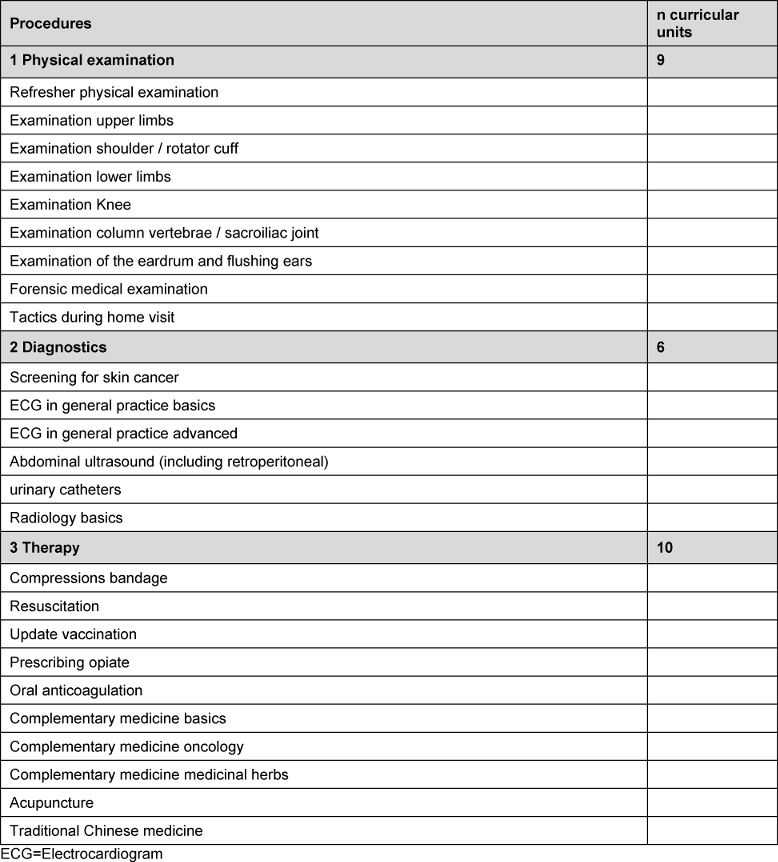New paths in post-graduate medical training in general practice – 8 years of experience with the pilot project Verbundweiterbildungplus Baden-Württemberg
Simon Schwill 1Julia Magez 1
Stefanie Joos 2
Jost Steinhäuser 3
Thomas Ledig 1
Aline Rubik 1
Wilhelm Niebling 4
Joachim Szecsenyi 1
Elisabeth Flum 1
1 University Hospital Heidelberg, Department of General Practice and Health Services Research, Heidelberg, Germany
2 University Hospital Tübingen, Institute of General Practice and Interprofessional Care, Tübingen, Germany
3 University Hospital Schleswig-Holstein, Campus Lübeck, Institute of Family Medicine, Lübeck, Germany
4 University Hospital Freiburg, Department of General Practice, Freiburg, Germany
Abstract
Background: In face of the looming shortage of general practitioners, primary healthcare providers and post-graduate training in general practice are increasingly becoming part of the political agenda in Germany. In 2009 the program “Verbundweiterbildung
Project description: The Competence Center for General Practice in Baden-Wuerttemberg supports the organization of regional networks dedicated to post-graduate medical education. First core element of the VWB
Results: Since starting in 2009, 685 physicians have entered the program and 141 have passed the examination to become medical specialists (as of December 2016). In total, 31 networks, 60 hospitals and 211 general practices have participated. The seminar sessions have been rated on average with 1.43 on a six-point Likert scale by the physician trainees (1=extremely satisfied, 6=extremely dissatisfied). Alongside the medical training, these physicians viewed the exchange of information and experiences with other physicians as very positive and important. In 185 seminars lasting 90 minutes each, the seminar program has presently covered 250 out of 320 units in the competency-based curriculum for general medicine. A total of 281 trainers have been trained in 13 train-the-trainer courses and have rated this course on average with 1.36 on a six-point Likert scale. Above all, the trainers emphasized the exchange of information and experiences with other trainers as very positive. In 2013 the DEGAM concept for its Verbundweiterbildung
Conclusion: The steadily increasing number of participants over the years demonstrates that the VWB
Keywords
General medicine, specialized medical training, mentoring, train-the-trainer, networked training programs, accompanying seminars
Introduction
In face of the looming shortage of general practitioners in Germany primary care provided by general practitioners and, as a result, medical education and post-licensure specialization in general practice have increasingly become a part of the political agenda. While searching for the root causes of this shortage of general practitioners, structural weaknesses in post-graduate education, such as the absence of a curriculum for physicians undergoing post-graduate training, were found and criticized. The unattractiveness of general practice in comparison to other medical specialties was also identified as a reason [1], [2]. Analysis of the German Medical Association (Bundesärztekammer) in 2015 shows that for the specialty medical exams taken (Facharztprüfung) there has been for years now a steady imbalance between medical specialists and general practitioners of 89.1% (n=10894) to 10.9% (n=1337) [3]. Despite the high number of medical specialists, there has been talk for some time now regarding a general shortage of doctors [4], and there have been discussions of increasing the quality of post-graduate medical education through structured specialized training in all subjects [5].
The quality of post-graduate medical education in general practice is under particular scrutiny: the German College of General Practitioners and Family Physicians (DEGAM) commissioned a report in 2008. International experts in medical post-graduate study asserted in 2009 that specialty training programs in general practice in Germany meet none of the European criteria for best practice [6]. In particular, the overall program structure was identified as insufficient and impaired access to rotations of posts to train for general practice was criticized. Furthermore, the lack of focus on competencies and inadequate presentation of theory, for example in seminars, were identified as faults. Other points of criticism included insufficiently available advisors, trainers who had not been trained according to professional teaching standards, and the specialty training’s general lack of relevancy to the future practice of primary care providers [6]. In a survey of physicians undergoing specialty training in general practice, nearly 90% of these physician trainees felt that a structured training program with rotating posts and the acquisition of business management skills as well as interprofessional collaboration in local healthcare networks were (very) important [7]. In another qualitative study, physician trainees identified several barriers, specifically the lack of structure in the different phases of post-licensure training, the low salaries during the out-patient phase of specialty training, and the general conditions, viewed as deterrent due to financial insecurity, that are associated with practicing general medicine in Germany [8].
The program Verbundweiterbildung
Project description
Background
From 2005 to 2007, a forum for post-graduate education existed at the Department of General Practice and Health Services Research of the Heidelberg University Hospital. Its goal was to support physicians undergoing specialty training and young medical specialists in general practice by offering seminars in parallel to professional practice, for instance on communication skills [9]. In 2007 the first competence center for general practice in Germany was established at the Heidelberg University Hospital networking the five medical schools in Baden-Württemberg with coordination by the Department of General Practice and Health Services Research [10]. The aim of the Competence Center for General Practice in Baden-Wuerttemberg (BW Competence Center) is to ensure future primary healthcare by increasing the attractiveness of general practice. To attain this goal, various projects and measures in the areas of research, education and post-graduate education have been developed and implemented [11]. The pilot project Verbundweiterbildung
The concept behind Verbundweiterbildungplus Baden-Württemberg
VWB
The legal basis for the VWB
The BW Competence Center was initially funded by the Baden-Württemberg Ministry for Science, Research and the Arts. Funding to expand the program in the rural areas was made available by the Baden-Württemberg Ministry for Rural Affairs and Consumer Protection. The Baden-Württemberg Ministry for Social Affairs and Integration gave support for the development and integration of digital teaching and learning programs. In addition, the program also receives support from the AOK Baden-Württemberg, a regional statutory health insurance provider, in the form of extra payment for the P1 billing rates for primary care given by general practitioners and from the Baden-Württemberg Association of General Practitioners (Hausärzteverband Baden-Württemberg) for ongoing training for the instructors. In 2015 after public funding ran out, the VWB
To ensure the quality of the post-graduate program, the VWB

The elements of Verbundweiterbildungplus Baden-Württemberg
The VWB
One of the three main elements of the VWB
The topics for the day-long seminars are based on the competency-based curriculum in general medicine. This competency-based curriculum was designed and developed in a collaborative process between the DEGAM, JADE (a network of trainees and young GPs in Germany) and the BW Competence Center. It covers – as a supplement to the logbooks required by the medical associations – the basic skills and competencies defined for general practitioners [15]. These are listed in detail, together with common general medical procedures, and assist those undergoing specialty training and their trainers by enabling the trainee to compare his or her self-assessment with that of the trainers. The competency-based curriculum in general practice is intended to serve as a common thread running through the entire course of the specialty training to help physicians focus on the information relevant to general practice [15], [16].
With the aim of encouraging physicians pursuing post-licensure training to set up practice in rural areas, Landtage are held once or twice a year. During these locally-held events representatives of rural regions – doctors, mayors, district administrators, etc. – have the opportunity to come into contact with physicians still undergoing specialty training. The main objectives are to communicate expectations, dispel preconceptions on both sides, and become familiar with the life of a country doctor (the wide range of care, new healthcare concepts, etc.) [17].
The second core element of the VWB
Since 2011 the third core element of the VWB
The network gatherings are intended to encourage cross-sector exchange between trainers from hospitals and trainers from medical practices. To ensure structural integrity and quality assurance, once each year all of the people involved in the post-graduate training networks, trainers from hospitals and practices, and the physician trainees are invited to come and hear about new developments regarding VWB
Further strategies of the VWB
Results
The concept behind Verbundweiterbildungplus Baden-Württemberg
Since its begin in 2009, a total of 685 physician trainees have entered the VWB


In 2010 the VWB
The elements of Verbundweiterbildungplus Baden-Württemberg
In the accompanying seminar program since 2009 a total of 185 difference seminar topics (see table 1 [Tab. 1], Attachment 1 [Att. 1] and Attachment 2 [Att. 2]) have been presented in 90-minute sessions on 25 seminar days per year. As a result, it has been possible to cover 250 of 320 curricular units of the competency-based general practice curriculum, plus additional topics such as telemedicine and healthcare for asylum seekers. At Attachment 1 [Att. 1] and Attachment 2 [Att. 2] and also table 2 [Tab. 2] and table 3 [Tab. 3] list the competency-based curricular topics covered in the special seminars (see Attachment 1 [Att. 1] and Attachment 2 [Att. 2], see table 2 [Tab. 2] and table 3 [Tab. 3]). A good 10% of the general practice seminar topics (48 of 418) were presented by physician trainees themselves in the form of peer-to-peer instruction. This number is increasing overall; in 2016, eight of 26 seminar presenters were physician trainee participants in the VWB


On eight training days each year up to 121 physician trainees attend sessions in Heidelberg and up to 81 at other sites; up to 30 physician trainees per year attend the two-day seminars. Per year each physician trainee is allowed to participate in a total of four day-long seminars and one two-day seminar. When registering for these seminars, the physician trainees tend to prefer medical topics such as dermatology or pediatrics, despite expressing a desire for organizational topics such as medical billing or the principles of business management.
The evaluation of the VWB
The mentoring offered by the VWB
The train-the-trainer seminars have been described by Ledig et al. [21]. Since its start, 13 two-day sessions have been held, and a total of 281 physicians have participated in the VWB
The annual network gatherings were received positively as a forum for finding out about changes and developments in the program.
Regular evaluations and scientific research have been successfully established: all components of the VWB
After completing the VWB
To further integrate this post-graduate program into an even larger network, fifth-year medical students who are interested in pursuing a post-licensure specialty in general practice are increasingly attending the special VWB
Discussion
With the VWB
Across Germany the VWB
In Baden-Württemberg between 2011 and 2015, approximately 680 physician trainees have successfully sat for and passed the exam for specialization in general practice, with the number of administered exams increasing from 108 in 2011 to 192 in 2015 [
In order to continue this upward trend in post-graduate medical education, it will be necessary to find permanent funding for university-based post-licensure programs like the VWB
Strengths/limitations
One of this project description’s strengths is that it is an overview of a successful post-graduate medical program. Some of the discoveries reported as results refer to the experiences of physician trainees and VWB
Conclusion
The growing numbers of participants over the years show that the concept of the VWB
Acknowledgement
The authors wish to thank all trainers and participants engaged in the VWB
Competing interests
All of the authors have worked as part of the VWB
References
[1] Kochen M. Strukturelle Ansätze zur Lösung der Weiterbildungsprobleme im Fach Allgemeinmedizin. Z Allg Med. 2007;83(10):427-430. DOI: 10.1055/s-2007-991142[2] Schmidt M. Das Trauerspiel um die Weiterbildung zum Facharzt Allgemeinmedizin – persönliche Bestandsaufnahme aus Sicht eines Weiterbildungsassistenten. Z Allg Med. 2008;84(1):10-13. DOI: 10.1055/s-2007-1004539
[3] Bundesärztekammer. Ärztestatistik 2014: Etwas mehr und doch zu wenig. Berlin: Bundesärztekammer; 2015. Zugänglich unter/available from: http://www.bundesaerztekammer.de/ueber-uns/aerztestatistik/aerztestatistik-2014/
[4] Martin W. Ärztlicher Stellenmarkt: Der Ärztemangel verfestigt sich. Dtsch Arztebl. 2010;107(4):161-162.
[5] Siebolds M, Beer AM, Kiwitt P, Meyring S. Strukturierte Facharztweiterbildung: Alter Wein in neuen Schläuchen oder Zukunftsoption? Dtsch Arztebl. 2006;103(42):2765-2768.
[6] DEGAM. Speciality Training for general practice in Germany 2009. Berlin: DEGAM; 2009. Zugänglich unter/available from: https://www.weiterbildung-allgemeinmedizin.de/downloads/Report-German-GP-Vocl-Training-Commission-July-final-amalgamated-not-confidential.pdf
[7] Roos M, Blauth E, Steinhäuser J, Ledig T, Joos S, Peters-Klimm F. Gebietsweiterbildung Allgemeinmedizin in Deutschland: Eine bundesweite Umfrage unter Ärztinnen und Ärzten in Weiterbildung. Z Evid Fortbild Qual Gesundh. 2011;105(2):81-88. DOI: 10.1016/j.zefq.2010.11.007
[8] Steinhäuser J, Paulus J, Roos M, Peters-Klimm F, Ledig T, Szecsenyi J, Joos S. Allgemeinmedizin ist trotzdem ein schönes Fach – eine qualitative Studie mit Ärzten in Weiterbildung. Z Evid Fortbild Qual Gesundh. 2011;105(2):89-96. DOI: 10.1016/j.zefq.2010.11.003
[9] Steinhäuser J, Joos S, Ledig T, Peters-Klimm F. FORUM Weiterbildung – gegen Zufall und Beliebigkeit. Z Allg Med. 2008;84(8):336-339. DOI: 10.1055/s-2008-1081208
[10] Joos S. Das Kompetenzzentrum Allgemeinmedizin. Versorgungsbericht. Stuttgart: Kassenärztliche Vereinigung Baden-Württemberg (KVBW); 2008. S.22-25
[11] Joos S, Szecsenyi J. Allgemeinmedizin: Bessere Vernetzung soll den Hausärztemangel bekämpfen. Dtsch Ärztebl. 2009;106:A-652.
[12] Steinhäuser J, Roos M, Habrer K, Ledig T, Peters-Klimm Frank, Szecsenyi J, Joos S. Bericht aus der Praxis: Das Programm der Verbundweiterbildungsplus des Kompetenzzentrums Allgemeinmedizin Baden-Württemberg – Entwicklung, Umsetzung und Perspektiven. Z Evid Fortbild Qual Gesundh. 2011;105(2):105-109. DOI: 10.1016/j.zefq.2011.02.002
[13] Frank JR, Snell L, Sherbino J. CanMEDS 2015 Physician Competency Framework. Ottawa: Royal College of Physicians and Surgeons of Canada; 2015.
[14] Flum E, Magez J, Aluttis F, Hoffmann M, Joos S, Ledig T, Oeljeklaus L, Simon M, Szecsenyi J, Steinhäuser J. Das Schulungsprogramm der Verbundweiterbildungplus Baden-Württemberg: Entwicklung und Implikationen für die Implementierung von Verbundweiterbildungsprogrammen in Deutschland. Z Evid Fortbild Qual Gesundh. 2016;112:54-60. DOI: 10.1016/j.zefq.2016.03.012
[15] Steinhaeuser J, Chenot JF, Roos M, Ledig T, Joos S. Competence-based curriculum development for general practice in Germany: a stepwise peerbased approach instead of reinventing the wheel. BMC Res Notes. 2013;6:314. DOI: 10.1186/1756-0500-6-314
[16] Flum E, Roos M, Jäger C, Chenot JF, Magez J, Steinhäuser J. Weiterentwicklung des Kompetenzbasierten Curriculums Allgemeinmedizin: Ergebnisse aus dem Praxistest. Z Allg Med. 2015;91(11):446-450.
[17] Flum E, Goetz K, Berger S, Ledig T, Steinhaeuser J. Can a 'rural day' make a difference to GP shortage across rural Germany? Rural Remote Health. 2016;16:3628.
[18] Hoffmann M, Flum E, Steinhäuser J. Mentoring in der Allgemeinmedizin: Beratungsbedarf von Ärzten in Weiterbildung. Z Evid Fortbild Qual Gesundh. 2016;112:61-65. DOI: 10.1016/j.zefq.2016.02.002
[19] Schwill S, Magez J, Jäger C, von Meißner WCG, Szecsenyi J, Flum E. Liebe auf den zweiten Blick - qualitative Erhebung von Motiven für den Quereinstieg in die Allgemeinmedizin. Z Evid Fortbild Qual Gesundh. 2016;118-119:73-79. DOI: 10.1016/j.zefq.2016.10.003
[20] Steinhäuser J, Ledig T, Szecsenyi J, Eicher C, Engeser P, Roos M, Bungartz J, Joos S. Train the Trainer für weiterbildungsbefugte Allgemeinärzte– ein Bericht über die Pilotveranstaltung im Rahmen des Programms Verbundweiterbildungplus. GMS Z Med Ausbild. 2012;29(3):Doc43. DOI: 10.3205/zma000813
[21] Ledig T, Flum E, Magez J, Eicher C, Engeser P, Joos S, Schwill S, Szecsenyi J, Steinhäuser J. Fünf Jahre Train-the-Trainer-Kurs für weiterbildungsbefugte Hausärzte - qualitativ-quantitative Analyse der Begleitevaluation. Z Evid Fortbild Qual Gesundh. 2016;117:65-70. DOI: 10.1016/j.zefq.2016.10.001
[22] Annan N, Maargaard R, Joos S, Ledig T, Steinhäuser J. Wie könnte ein Train the Trainer Programm aussehen? –Eine Internet-Recherche. Z Allg Med. 2010;86:444-449.
[23] Joos S, Roos M, Ledig T, Bilger S, Szecsenyi J, Steinhäuser J. Perspektiven und Erfahrungen weiterbildungsbefugter Ärzte für Allgemeinmedizin - eine Umfrage in Baden-Württemberg. Z Evid Fortbild Qual Gesundh. 2011;105(2):97-104. DOI: 10.1016/j.zefq.2010.11.004
[24] Margaard R. An external report on the training of General Practitioners in the Verbundweiterbildungplus - scheme in Baden-Württemberg 2012. Aarhus: University of Aarhus; 2012. Zugänglich unter/available from: https://www.weiterbildung-allgemeinmedizin.de/downloads/VWB_report_2012_eng.pdf
[25] Steinhäuser J , Chenot JF. DEGAM Konzept Verbundweiterbildungplus. Berlin: DEGAM; 2013. Zugänglich unter/available from: http://www.degam.de/files/Inhalte/Degam-Inhalte/Ueber_uns/Positionspapiere/DEGAM_Konzept_Verbundweiterbildung_plus_130621.pdf
[26] Portenhauser F, Steinhäuser J. Die meisten bleiben im Ländle. Deskriptive Analyse des baden-württembergischen "Förderprogramms Allgemeinmedizin" in den Jahren 2008 bis 2011. Dtsch Arztebl. 2015;112(16):17.
[27] DEGAM. Positionspapier. Kriterien für Kompetenzzentren Allgemeinmedizin. Berlin: DEGAM; 2015. Zugänglich unter/available from: http://www.degam.de/files/Inhalte/Degam-Inhalte/Presse/Presseordner_2015/DEGAM-Positionspapier_Kriterien%20fuer%20Kompetenzzentren%20Allgemeinmedizin.pdf
[28] Flum E, Berger S, Szecsenyi J, Marquard S, Steinhaeuser J. Training Standards Statements of Family Medicine Postgraduate Trainig - A Review of Existing Documents Worldwide. PLoS ONE. 2016;11(7):e0159906. DOI: 10.1371/journal.pone.0159906




